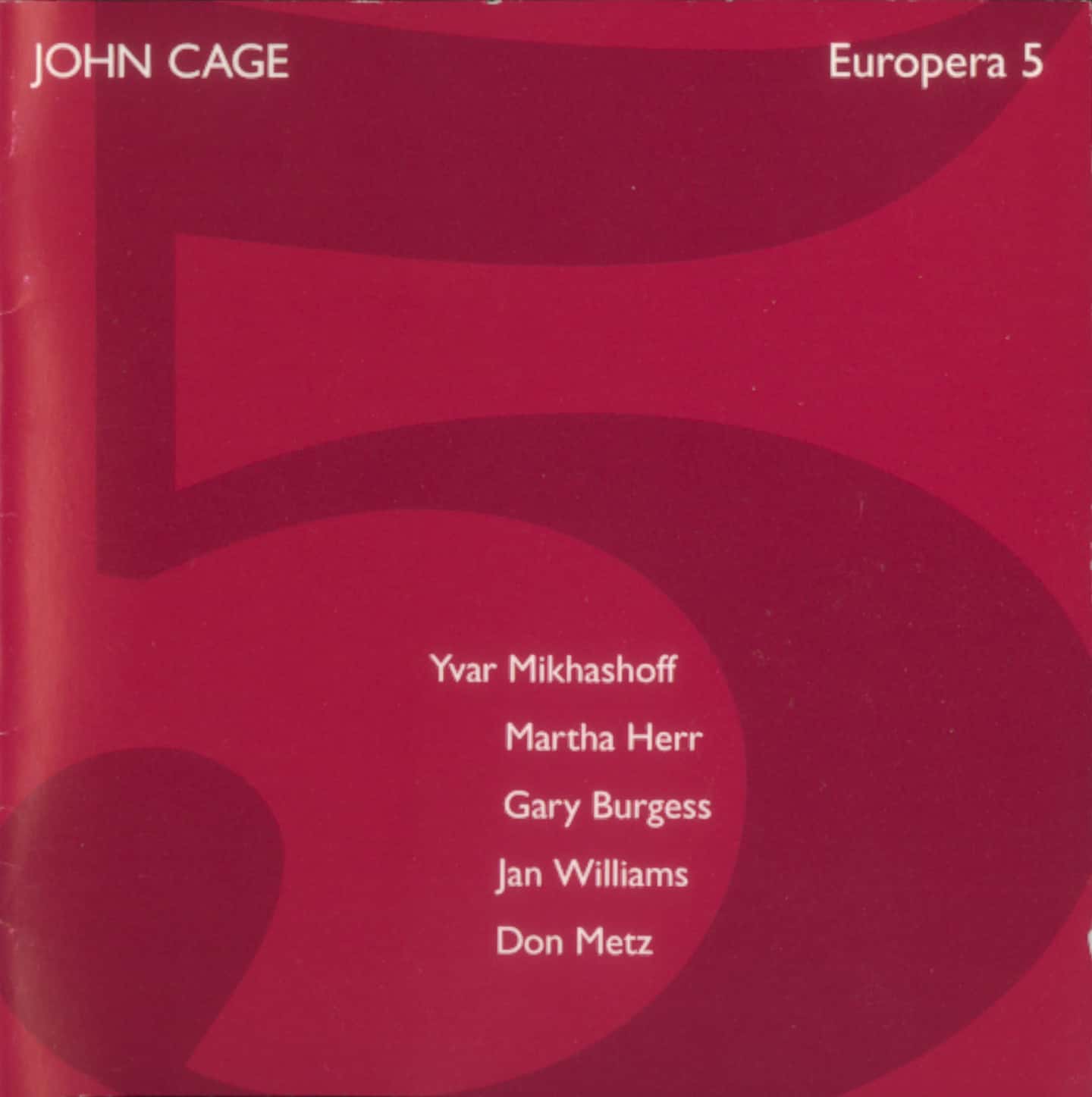Cage Edition 8-Europera 5
Yvar Mikhashoff, piano
Martha Herr, soprano
Gary Burgess, tenor
Jan Williams, 78-rpm victrola
Don Metz, “Truckera” tape
Europera 5 (1991) was John Cage’s last, and most portable opera. It is a collage scored for two singers, eachsinging five arias of their own choosing from the standard opera repertoire. A pianist “accompanies” them by playing sixdifferent opera transcriptions. They are joined by a single 78-rpm victrola-player, playing six historical operarecordings and a performer playing a pre-recorded tape, plus the use of a radio and a silent television.
The separation of these various operatic elements in Europera 5 produces a spaciousness and awareness ofdistances that is so characteristic of Cage’s music. Cage also offers us a unique sense of historical distance–thesingers performing the older operatic music in our presence; the pianist performing “romanticized” interpretations ofromantic music and the victrola presenting old music in old performances, coming to us through an old technology. It isonly in the silences and the use of the radio that our present time intrudes.
This recording is a unique document of John Cage’s final opera. It was recorded at the very first time thework was performed in its entirety: during the dress rehearsal before the world premiere. John Cage was present, and theperformers included the brilliant pianist Yvar Mikhashoff, who championed Cage’s Europeras 3 & 4 and for whomCage wrote Europera 5.
Released 1989.
Reviews
“***** This is no opera you have ever heard, and yet it is every opera you have ever heard–tinged with nostalgia, something one doesn’t usually associate with Cage, but it is typically Cage in the way that it refocuses your attention on familiar sounds that then become completely new in the context of the piece.”
—Damon Krukowski, Tower Classical Pulse!
“…there’s a dreamlike ambience, a marvelous confusion of time and plot, as in the “duets” of different material between the live and “historic” singers, or when the radio (unintentionally tuned to a jazz station), piano and singers create a counterpoint of styles, as if unaware of each other’s existence….Even the missing orchestra adds to the drama, since we are so conditioned to hear it behind the arias, that, along with the music’s fragmentation, it’s as if the opera’s flesh and skeleton were removed, leaving only it’s spirit….I found Europera 5 to be a gentle and tender affair, and believe opera lovers may find even more here to appreciate, once they accept the completely unfamiliar context.”
—Art Lange, Fanfare
“Europera 5 is an hour-long celebration of good old-fashioned opera…Because I love traditional opera (particularly historical recordings) as much as I love avant-garde music, Europera 5 is my idea of a good time. It has shock value, it has great tunes,a nd it makes you listen even as it interferes with your listening. As it affectionately looks at the past, it insistently squeezes your hand and reminds you that this is today. Europera 5 will probably be remembered as one of Cage’s most romantic works, not just because of the source music, but because of its poignancy…Little remains to be said of the performance itself, which was made in the presence of the composer…The sound is good and the book is excellent.”
—Raymond S. Tuttle, Internet News Groups
Ghosts of Operas Past: John Cage’s Europeras
While so many contemporary composers express the weight of opera’s history and baggage, John Cage revered both in his offerings to the genre. By allowing singers to choose their favorite arias, sung a cappella or against unrelated coincidental accompaniment, he presented them unfettered, juxtaposed, out of sequence, out of time and space, as individual gems to be rethought. Like ghosts of operas past, fragments of classic 78rpm recordings emanate from vintage Victrola along with the Truckeras collage tapes of superimposed operas played as if overheard from the radios of passing vehicles, offering filmy glimpses of bygone performances set against living voices performing their showy war horses. The clarity, sparseness, and lucidity of the more easily tourable chamber work Europeras 5 (mode 36), scored for two singers with piano transcriptions played with Lisztian grandiosity and panache by the late Yvar Mikhashoff, makes it for me the most successful of the mode recorded series.
—Joan La Barbara, Schwann Opus, Summer 1995
Links
John Cage on Mode:
John Cage Profile/Discography
Yvar Mikhashoff on Mode:
Alvin Curran: Piano Works (mode 49)
Yvar Mikhashoff: Opera (mode 154/155)
Yvar Mikhashoff profile
The Yvar Mikhashoff Trust web site

